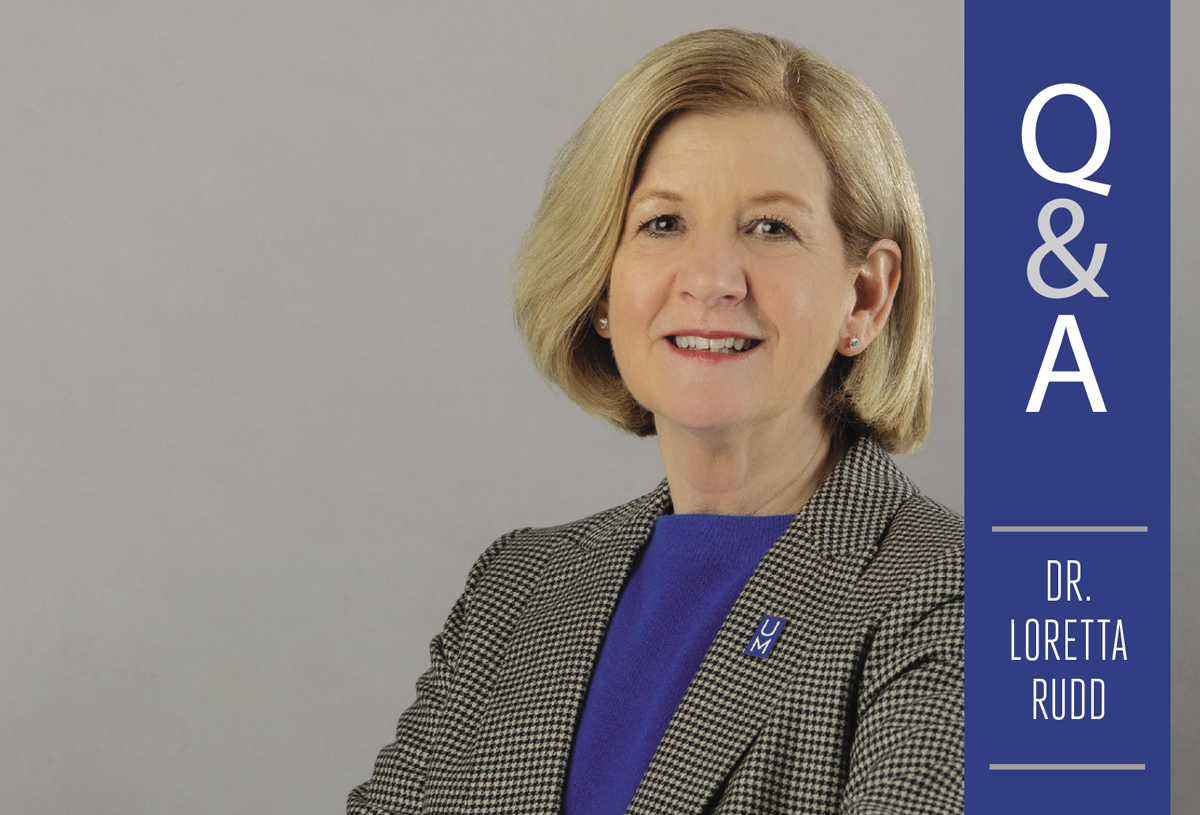
Dr. Loretta Rudd is a clinical professor and program coordinator in Child Development and Family Studies (CDFS) at the University of Memphis. During her eight years as first lady at UofM, she has designed and taught Introduction to the Field of Child Development and Family Studies, Parent Child Relationships, Understanding Children’s Behavior, Integrated Curriculum for Early Learners, Social Emotional Development in Young Children and Ethics for Early Childhood Professionals. She has also designed three new degree programs — Early Care and Learning, Early Intervention Specialist and Child Life Specialist — for the College of Professional and Liberal Studies. Four of the five degree programs in CDFS are offered fully online through UofM Global.
Rudd has led the University’s efforts to expand LENA programs — designed to improve children’s futures through data-driven programs — within the Memphis community. She has served as chair for UofM Women in Leadership and Philanthropy; as a board member for Libertas School of Memphis, Girl Scouts Heart of the South, Shelby County Early Childhood Education Consortium and the ACE Foundation; and as a member of the First Eight Leadership Council and the Early Success Coalition Core Leadership.
Q: What has the UofM meant to you and your family during your time here?
A: When David interviewed, we all began researching the UofM and the City of Memphis. While we certainly discovered some challenges, we all agree that the UofM was a place we could work and perhaps make a difference. I especially wanted to work on revising the child development degree program and working in the community. When we are all together, we frequently talk about the many physical changes made to the campus as well as the advances in athletic and academic programs. Both our children have taken courses or worked on research projects at the UofM. This is the longest tenure we have had at any of our previous university positions.
Q: You were a first-generation college graduate, as are many UofM students, what was that journey like for you and what do you see at the UofM that makes it a great destination for such students?
A: Oh, my! I truly knew nothing about college and how to navigate financial aid, course selection, meal plans, dorm living, etc. I just knew that I wanted to be a deaf-education teacher and there were only two public universities in Texas that offered the program. David is also a first-generation scholar, so we really leaned on each other to navigate the system. I am proud that the UofM has instituted the First-Generation Student Success program! A phrase I use often in my classes is, “You don’t even know what you don’t know,” and that definitely applies to first-generation students. Providing student and faculty mentors to the first-generation students over the course of their time at the UofM is powerful, not only for the current student but for their siblings and their future children. After I earned my degree, three of my six siblings attended college with two earning bachelor’s degrees and one earning a master’s degree. Now, our children have both earned master’s degrees and our son will graduate from the University of Texas Law School in May. Our daughter plans to earn a doctorate as well.
Q: You’ve been the leader behind so much growth for the LENA program and child development at the UofM in general, how has that experience been for you?
A: First, let me say that I have an amazing team implementing LENA in the community. I did my dissertation work in childcare centers analyzing video of child caregivers’ language interactions with the young children in their care. LENA now provides a technology that allows us to capture the adult-child interactions, number of adult words and amount of digital language a child is exposed to in a 16-hour time span. We work with child caregivers and parents to provide training so they can enhance their interactions with the children and decrease the digital (e.g., TV and video devices) language in their care. We’ve seen some significant gains and expect that these enhancements will set a foundation for children to be ready for kindergarten at age 5.
Q: What do you believe and hope the future looks like for the University in general and as it pertains to child development education?
A: I hope the University will continue its path of providing excellent, affordable educational programs with the stellar student-support systems created in the past few years. I hope that the students graduating with a degree in Early Care and Learning, Early Intervention Specialist, Childcare Administration and Child Life Specialist will stay in Memphis, enhancing the lives of young children and their families. I also hope future Child Development and Family Studies graduates will “preach the word” about the importance of the first three years of life, in regard to brain development, so that every child will have a firm foundation of emotional, social and language development supporting all future learning.
Q: With President Rudd stepping away and planning to take some time off, do you plan to do the same?
A: I do! I am looking forward to traveling with him. While it will be nice to “be still” for a bit, we both have research data to analyze and write up for publications. I also plan to do some on-site visits of early care and learning systems in the different countries we visit. Hopefully, these visits will inform me in meaningful ways so that I can share with local and state policymakers.
Q: Is there anything else, professionally or personally, you would like to share with UofM alumni and supporters?
A: I would say get involved with the academic side of the University and, if you’re able, give your time, talent or treasure. As David has said many times, “A great city deserves a great university,” and the UofM is just that!
